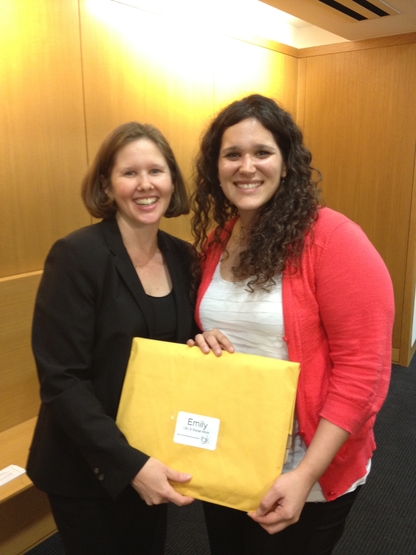
Emily Bhandari always knew she would choose a profession that made the world a better place. In her early days as a master's student in the Steve Hicks School of Social Work, Emily noted the positive impact that strong networks of loved ones and social safety nets could provide, even in the face of hardship.
“The complexity of mental health has always interested me. The journey of wellbeing is never-ending, yet taking care of your mental health has the power to completely change your circumstances,” Emily said.
Through her graduate work, she became more aware of the various barriers (cultural, monetary, access, etc.) that many face when seeking mental health support such as medication or therapy.
“I find a lot of joy in working to fill those gaps and supporting equity-related investments in mental health and wellbeing in Texas communities,” said Emily, who currently serves as the Strategic Learning and Evaluation program officer at the Hogg Foundation for Mental Health.
At the Hogg Foundation, Emily supports the organization in its learning journey, advocating for more community-led, participatory, equitable evaluation and research practices. In recent years, benefactors of the foundation's investments have become more involved in every step of the evaluation process, starting with co-developing the initial research question.
“Participatory evaluation might slow down your timeline but will surface more meaningful insights,” Emily said, explaining that this type of community-based research challenges the belief that quantitative data is more valuable than qualitative data.
In addition to being data scientists, Emily explains, “evaluators now need to have skills in group facilitation, learning techniques, data visualization, and capacity-building,” especially as more organizations and communities focus on implementing equitable evaluation practices.
Much of what Emily learned about the role of nonprofits and philanthropy in supporting resilient communities is a result of her time in the RGK Center’s Nonprofit Studies portfolio program as a dual degree student in the School of Social Work and the LBJ School of Public Affairs.

Moira Porter (left) presenting Emily Bhandari (right) with her Nonprofit Studies certificate in 2013.
“The RGK Center helped me realize that nonprofits and funders should be working together, as partners, in solving the problems we are seeing in our communities,” Emily said. “I learned that the individuals with direct experience with the issue are the ones with the most knowledge and wisdom about how to instigate meaningful change.”
As she reflected on her time in the program, she recalled her experience in one of her first evaluation courses, taught by former RGK Center director Dr. Peter Frumkin. Through this course, she learned to question the reason behind collecting certain data and the importance of clarifying how the evaluation findings will be used to inform decision-making.
“One of my most memorable takeaways from the course was that evaluators must include an analysis of budgets and expenditures. Dr. Frumkin highlighted that these funding decisions provide powerful insights into the priorities and values of an organization or governmental institution.”
From Emily: Tips for Promoting Mental Health in Your Everyday Life
-
Engage in self-reflection and treat yourself as if you are your best friend. Sometimes we treat others better than we treat ourselves. Ask yourself what would I tell my friend if they came to me feeling this way? And then give yourself that advice!
-
Track what “bubbles up” for you when you try to integrate that advice… whether it be resistance to accepting the idea itself or sadness about how overwhelming change feels. Greet these feelings with nonjudgement. Sometimes mental health isn’t all about actions, it’s more about your relationship with yourself and making sure that you are tending to the needs of your body – just like physical health.
-
At times, you might want to seek extra support or have an interest in learning new tools for maintaining your wellbeing. Go for it! Would you hesitate to ask your doctor about a persistent cough or a mole on your body that is getting bigger and bigger? Remove the stigma of you being “sick” and flip it to honor that everyone needs help sometimes!
-
Health (mental or physical) is a journey, not a destination. When you find a comfortable and safe enough place, try sharing with friends about your mental health journey. I bet you’ll be surprised that you are not alone. We can learn a lot from meaningful connection with others, friends, family, or colleagues, who take their mental health journey seriously… and that usually is free!
In addition to her position at the Hogg Foundation, Emily recently founded a consulting practice, Strategic Inquity, LLC. Get in contact with Emily by reaching out on LinkedIn or emailing her at emily.bhandari@austin.utexas.edu / Emily@strategicinquiry.org.

